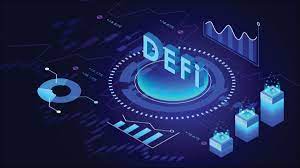Decentralized finance (DeFi) is based on the concept of equal partners, which removes middlemen from the system. Leveraging on the philosophy of equity and self-fulfilling “smart contracts” on blockchain networks, DeFi democratizes finance and replaces traditional centralized institutions such as banks, brokers, and NBFCs (Non-Bank Financial Companies).Visit: Decentralize Finance
DeFi uses smart contract technology on the blockchain network without human intervention. This reduces the chance of error and increases efficiency.
How does DeFi work?
“If the cryptocurrency market overall or a digital asset is solving a problem, it’s going to drive some value,” said Brad Garlinghouse, CEO and a member of the Board of Directors of Ripple, a real-time gross settlement system, currency exchange and remittance network created by Ripple Labs Inc., a US-based technology company.
Decentralized finance uses the blockchain technology used by cryptocurrencies. Blockchain is a distributed and protected database or ledger. Applications called dApps are used to process transactions and launch blockchain. On the blockchain, transactions are recorded in blocks and then verified by other users. If this verifier approves the transaction, the block is closed and encrypted; Another block is created containing information about the previous block.
The blocks are “linked” together by the information in each processed block, giving it the name blockchain. This concept, along with other security protocols, ensures the security of the blockchain.
The Impact of DeFi on the Fintech Industry:
One of the most influential use cases of is in the insurance industry. projects such as Nexus Mutual, Opyn, and VouchForMe also offer cryptocurrency insurance coverage on the blockchain network. Rising inflation and falling interest rates in fiat currencies have made saving and investing more difficult for middle-class people around the world. With a no-loss savings strategy, projects such as PoolTogether, Dharma, and Argent have created alternative solutions for risk-free savings and investments.
Decentralized finance uses the blockchain technology used by cryptocurrencies. Blockchain is a distributed and protected database or ledger. Applications called dApps are used to process transactions and launch blockchain. On the blockchain, transactions are recorded in blocks and then verified by other users. If this verifier approves the transaction, the block is closed and encrypted; Another block is created containing information about the previous block.
Decentralized finance uses the blockchain technology used by cryptocurrencies. Blockchain is a distributed and protected database or ledger. Applications called dApps are used to process transactions and launch blockchain. On the blockchain, transactions are recorded in blocks and then verified by other users. If this verifier approves the transaction, the block is closed and encrypted; Another block is created containing information about the previous block.
As DeFi replaces traditional banking systems, lending and borrowing protocols have also become one of the main uses of . Several DeFi projects, such as Compound and PoolTogether, are focused on the peer-to-peer lending and lending (P2P) market. Distributed ledger technology (DLT) has accelerated transactions, especially in cross-border payments where transaction costs and delays create barriers for senders and recipients. DLT democratizes banking by allowing anyone to borrow and even lend fiat against cryptocurrency collateral. This creates a new form of economy.
The Findora Defi system hosts transactions, assets, and programmable contracts that can be proven compliant, without compromising on privacy. Decentralized finance (DeFi) blockchain project Findora Defi has received an eight-figure funding round Read More

